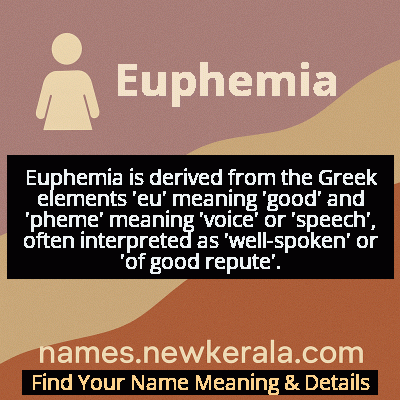Euphemia Name Meaning & Details
Origin, Popularity, Numerology Analysis & Name Meaning of Euphemia
Discover the origin, meaning, and cultural significance of the name EUPHEMIA. Delve into its historical roots and explore the lasting impact it has had on communities and traditions.
Name
Euphemia
Gender
Female
Origin
Greek
Lucky Number
6
Meaning of the Name - Euphemia
Euphemia is derived from the Greek elements 'eu' meaning 'good' and 'pheme' meaning 'voice' or 'speech', often interpreted as 'well-spoken' or 'of good repute'.
Euphemia - Complete Numerology Analysis
Your Numerology Number
Based on Pythagorean Numerology System
Ruling Planet
Venus
Positive Nature
Harmonious, responsible, caring, and artistic.
Negative Traits
Overly idealistic, superficial, possessive, or jealous.
Lucky Colours
Pink, turquoise.
Lucky Days
Friday.
Lucky Stones
Diamond, turquoise.
Harmony Numbers
2, 3, 9.
Best Suited Professions
Artists, musicians, teachers, healthcare workers.
What People Like About You
Warmth, nurturing nature, artistic flair.
Famous People Named Euphemia
Saint Euphemia
Christian Martyr
Early Christian martyr venerated in both Eastern Orthodox and Catholic traditions
Euphemia of Chalcedon
Christian Saint
Martyred during Diocletian persecutions, her shrine hosted the Council of Chalcedon
Euphemia Losch
Austrian Actress
Prominent Austrian film and stage actress in German cinema
Euphemia Allen
British Composer
Composer of the famous piano piece 'Chopsticks'
Name Variations & International Equivalents
Click on blue names to explore their detailed meanings. Gray names with will be available soon.
Cultural & Historical Significance
Extended Personality Analysis
The name Euphemia carries distinct personality associations rooted in its meaning and historical bearers. Typically, Euphemias are characterized by exceptional communication skills, intellectual curiosity, and diplomatic nature. They possess a natural elegance in expression, often able to articulate complex thoughts with remarkable clarity and grace. This verbal dexterity makes them excellent storytellers, teachers, and mediators. Their thoughtful approach to language reflects a deeper philosophical nature—they understand the power of words to shape reality and relationships. Euphemias tend to be deeply principled individuals who value authenticity and integrity in all interactions. They often exhibit a blend of traditional wisdom and progressive thinking, making them respected advisors and confidantes. While they may appear reserved in unfamiliar settings, they reveal warm, engaging personalities in trusted company. Their combination of intelligence, empathy, and verbal skill makes them particularly effective in roles requiring persuasion, education, or conflict resolution. Historically, the name's association with saintly figures adds a dimension of spiritual depth and moral courage, suggesting individuals who stand firm in their convictions while maintaining compassion for others.
Modern Usage & Popularity
In contemporary naming practices, Euphemia represents a sophisticated choice for parents seeking classical names with historical depth and distinctive character. While not among the most popular names, it has experienced a quiet resurgence as part of the vintage name revival movement. Current usage trends show Euphemia appearing more frequently in educated, literary-minded families and among those with Greek heritage or classical interests. The name's appeal lies in its combination of historical significance, elegant sound, and the charming nickname 'Effie.' Modern parents often choose Euphemia as an alternative to more common classical names like Eleanor or Charlotte, appreciating its uniqueness while maintaining traditional credentials. Social media and naming websites have played significant roles in reintroducing Euphemia to new generations, with many highlighting its strong female associations and intellectual connotations. The name appears more commonly in the United Kingdom and Commonwealth countries than in the United States, reflecting its stronger historical presence in British naming traditions. Its current usage pattern suggests gradual but steady growth as more parents discover its rich heritage and timeless elegance.
Symbolic & Spiritual Meanings
Euphemia embodies profound symbolic meanings that transcend its literal translation. At its core, the name represents the ancient Greek ideal of 'speaking well'—not merely eloquent expression but the conscious use of language to create harmony, truth, and beauty. Symbolically, Euphemia stands against careless speech and verbal violence, advocating instead for words that heal, enlighten, and connect. In Christian symbolism, through Saint Euphemia's martyrdom, the name represents unwavering faith and the power of conviction to withstand persecution. It symbolizes the transformation of classical virtue into Christian sanctity, bridging wisdom traditions across civilizations. Metaphorically, Euphemia suggests someone who brings light to darkness through clarity of expression, who can articulate universal truths in ways that resonate across cultures and generations. The name also symbolizes intellectual and spiritual integrity—the alignment of thought, word, and action. In modern contexts, Euphemia represents resistance to the degradation of language in digital communication, standing for thoughtful, meaningful discourse in an age of soundbites and superficial interaction. It embodies the ideal that how we speak reflects and shapes who we are as individuals and communities.

